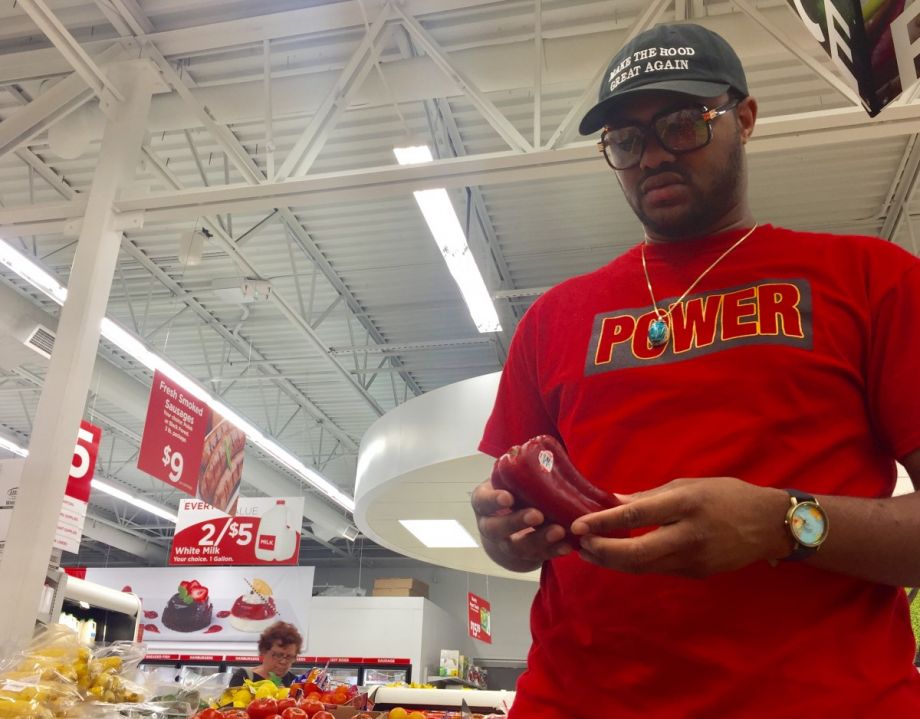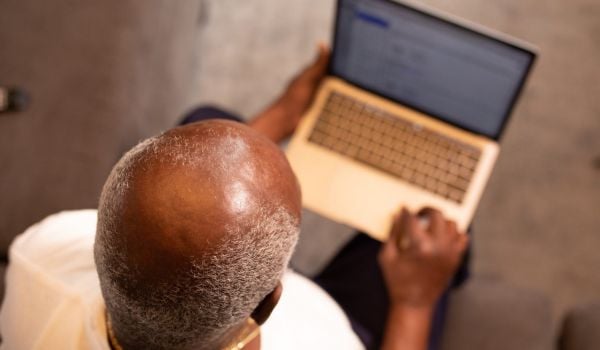Raphael Wright has made it his business to turn the hip-hop culture he grew up immersed in on the east side of Detroit into a profitable enterprise.
It started at 13 when he began selling clothes on his own eBay store, and continued in 2012 when he launched Plug’d Media – a hip-hop-centered collective – and in 2015, when he sold his T-shirt company HustleMania and used the cash to invest in other ventures.
In 2016, at age 28, Wright wrote a handbook to inspire others who were brought up in disinvested communities, “How 2 Hustle: Entrepreneurial Lessons, Principles, and Strategies from Street Hustlers in Amerikkka’s Urban Underground Economy.”
Now he wants to apply those street hustler tactics to a more impactful community venture: opening Detroit’s only black-owned supermarket franchise, to be called Us Food Market.
“There’s Kroger, that’s about it, and you have to go across 8 Mile for that. Otherwise, the food is never good, it’s overpriced. Customer service is little to nonexistent,” says Wright.
He’s not alone in his frustration over the lack of grocery options in the city. While a number of markets that cater to the Latino demographic are popular in Southwest Detroit, residents by and large prefer to travel outside the city limits for their food needs.
Each year, $178 million leaks out of the city and goes to suburban grocery chains, according to 2014 data from the Detroit Economic Growth Corporation.
Wright is in the midst of a fundraising and marketing blitz this year, with a goal of opening a market by spring 2018. He’s seeking money from a variety of sources. He’s working with Motor City Match, which helps to connect Detroit entrepreneurs to real estate space, to secure a location. He’s raised more than $32,000 online in a GoFundMe campaign. Sales from his “Make the Hood Great Again” hats have earned him another $5,000 and are helping create buzz on Instagram and Facebook.
He’s also working with the Michigan Good Food Fund, a $30 million public-private partnership that helps entrepreneurs who are increasing access to healthy food. “We’re really honored to work with people like Raphael, because he’s really bringing a mission-driven grocery store to Detroit,” says Jean Chorazyczewski, project director for the Ann Arbor, Michigan-based fund, which also provides business assistance.
Wright wants Us Food Market to be a neighborhood hub — not just a place to buy food — where one can pick up healthy prepared meals and fresh produce, learn a new recipe on an accompanying app, and attend public events.
“We want to invest in our community, to have a place where we can have conversations with our local politicians and that can be a cultural center,” Wright says. “I want my grocery store to be that beacon.”
Wright’s work fits into a larger effort to restore a legacy of black wealth to Detroit.
The city has a long history of black commerce. The Paradise Valley business district was at the center of African-American entrepreneurship and culture from the 1920s to about the middle of the 20th century, according to the Detroit Historical Society, driven largely by the Great Migration of Southern blacks looking for jobs in the automotive industry.
More than 300 black-owned businesses and nightclubs served the Black Bottom neighborhood, just outside of downtown. In the 1960s, much of the area was razed for freeways.
As investment declined, Detroiters developed alternatives. They’ve transformed vacant land into urban gardens and farms. There are more than 1,500 black-owned agriculture sites within the city limits. They’ve established a resilient informal economy based on bartering, time trading and underground enterprises.
In recent years, as Detroit struggled to emerge from bankruptcy, it has captured national headlines as a “comeback city,” lush with a so-called food revival stemming from an influx of trendy restaurants and the opening of a Whole Foods Market in 2013.
Meanwhile, Detroit’s last black-owned grocery, Metro Foodland, shut its doors in 2014 after three decades in business on the city’s west side.
Wright’s not alone in his desire to reverse that trend. A number of food-based organizations are working to create a sustainable and inclusive food system in the city.
FoodLab Detroit, established in 2011, is a support network of food entrepreneurs, and offers commercial kitchen space and regular discussions around the business.
While both Wright’s supermarket venture and FoodLab’s focus are on entrepreneurship, Detroit Black Community Food Security Network’s focus is on public policy and building self-reliance. The nonprofit, led by Malik Yakini, operates the 7-acre D-Town Farm. DBCFSN plans to open a 7,500-square-foot food co-op, called Detroit Food Commons, in 2018. It will have a 50-seat cafe, an incubator kitchen, a 6,000-square-foot community meeting space and offices for the organization. Cooperative ownership will be held by about 1,200 members.
“The idea is a collective as a tool to build collective wealth,” says Yakini, who adds that even though their goals differ, he’s supportive of Wright’s objective.
DBCFSN is working to raise funds to fill a $3 million gap in the $11 million-plus project, which is being funded by a combination of member/owner equity, grants, donations and debt financing. So far, $600,000 of that shortfall has been raised.
For Wright’s part, opening Us Food Market is also personal. He learned he was diabetic when he was 19 and has had to overhaul his own diet to keep his health in check.
“It’s slapping us in the face, all the bad food that we’ve been eating,” Wright says. “There are healthier alternatives that’s medicine for your body.”

Serena Maria Daniels is an award-winning Chicana journalist and founder and editor of Tostada Magazine, a Detroit-based digital food & culture journalism platform that centers stories and perspectives of immigrants and people of color.
Follow Serena .(JavaScript must be enabled to view this email address)
















